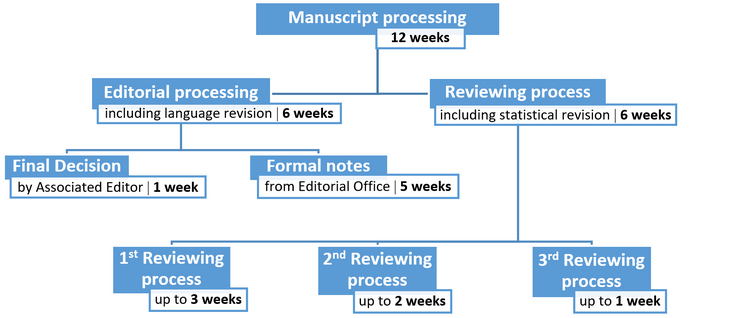Due to the current situation, the Journal of Water and Land Development has suspended scientific cooperation with Russian and Belarusian institutions as of February 24, 2022. Unfortunately, manuscripts from these countries will not be accepted for publication in our journal until further notice.
Our ambition is to meet the timelines defined in the following scheme

Reviewing procedure
Procedure of reviewing submitted papers agrees with recommendations of the Ministry of Science and Higher Education published in a booklet: „Good practices in review procedures in science”.
Reviewing form may be downloaded from the Journal’s web page.
1. Papers submitted to the Editorial Office are primarily verified by editors with respect to merit and formal issues. Texts with obvious errors (formatting other than requested, missing references, evidently low scientific quality) will be rejected at this stage.
2. Primarily accepted papers are sent to the two independent referees from outside the author’s institution, who:
4. Reviewing proceeds in the double blind process (authors and reviewers do not know each other’s names) recommended by the Ministry.
5. A number is attributed to the paper to identify it in further stages of editorial procedure.
6. Potential referee obtains summary of the text and it is his/her decision upon accepting/rejecting the paper for review within a given time period.
7. Referees are obliged to keep opinions about the paper confidential and to not use knowledge about it before publication.
2. Primarily accepted papers are sent to the two independent referees from outside the author’s institution, who:
- have no conflict of interests with the author,
- are not in professional relationships with the author,
- are competent in a given discipline and have at least doctor’s degree and respective scientific achievements,
- have unblemished reputation as reviewers.
4. Reviewing proceeds in the double blind process (authors and reviewers do not know each other’s names) recommended by the Ministry.
5. A number is attributed to the paper to identify it in further stages of editorial procedure.
6. Potential referee obtains summary of the text and it is his/her decision upon accepting/rejecting the paper for review within a given time period.
7. Referees are obliged to keep opinions about the paper confidential and to not use knowledge about it before publication.
8. Review must have a written form and end up with an explicit conclusion about accepting or rejecting the paper from publication. Referee has a possibility to conclude his/her opinion in a form:
- accept without revision;
- accept with minor revision;
- accept after major revision,
- re-submission and further reviewing after complete re-arrangement of the paper,
- reject.
10. Editors do not accept reviews, which do not conform to merit and formal rules of scientific reviewing like short positive or negative remarks not supported by a close scrutiny or definitely critical reviews with positive final conclusion and vice versa. Referee’s remarks are presented to the author. Rational and motivated conclusions are obligatory for the author. He/she has to consider all remarks and revise the text accordingly. Referee has the right to verify so revised text.
11. Author of the text has the right to comment referee’s conclusions in case he/she does not agree with them.
12. Editor-in Chief (supported by members of the Editorial Board) decides upon publication based on remarks and conclusions presented by referees, author’s comments and the final version of the manuscript.
13. Rules of acceptation or rejection of the paper and the review form are available at the web page of the Editorial House or the journal.
14. Present list of cooperating reviewers is published once a year.
15. According to usual habit, reviewing is free of charge. Additionally, language revision is at an attractive price.
16. Papers rejected by referees are archived by Editorial System.